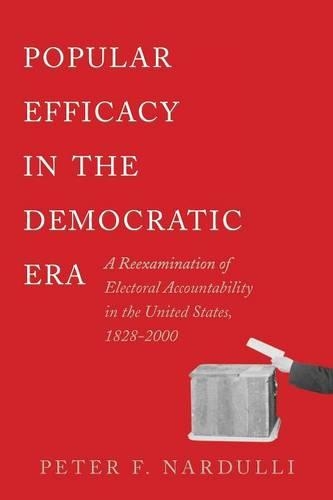
Popular Efficacy in the Democratic Era: A Reexamination of Electoral Accountability in the United States, 1828-2000
(Paperback)
Publishing Details
Popular Efficacy in the Democratic Era: A Reexamination of Electoral Accountability in the United States, 1828-2000
By (Author) Peter F. Nardulli
Princeton University Press
Princeton University Press
5th November 2007
United States
Classifications
Professional and Scholarly
Non Fiction
324.650973
Physical Properties
Paperback
272
Width 152mm, Height 235mm
425g
Description
Social scientists have long criticized American voters for being "unsophisticated" in the way they acquire and use political information. The low level of political sophistication leaves them vulnerable to manipulation by political "elites," whose sway over voters is deemed incontrovertible and often decisive. In this book, Peter Nardulli challenges the conventional wisdom that citizens are "manageable fools," with little capacity to exercise independent judgment in the voting booth. Rather, he argues, voters are eminently capable of playing an efficacious role in democratic politics and of routinely demonstrating the ability to evaluate competing stewards in a discriminating manner. Nardulli's book offers a cognitively based model of voting and uses a normal vote approach to analyzing local-level election returns. It examines the entire sweep of United States presidential elections in the democratic era (1828 to 2000), making it the most encompassing empirical analysis of presidential voting to date.Nardulli's analysis separates presidential elections into three categories: those that produce a major, enduring change in voting patterns, those that represent a short-term deviation from prevailing voting patterns, and those in which the dominant party receives a resounding endorsement from the electorate. These "disequilibrating" elections have been routine in American electoral history, particularly after the adoption of the Progressive-Era reforms. Popular Efficacy in the Democratic Era provides a dramatically different picture of mass-elite linkages than most prior studies of American democracy, and an image of voters as being neither foolish nor manageable. Moreover, it shows why party elites must take proactive steps to provide for the core political desires of voters.
Reviews
"Nardulli hopes to influence the way in which social scientists conceptualize and investigate democracy. If researchers change how they approach their work, they might discover genuine political problems and ultimately make better real-world recommendations."--Nicole Mellow, Political Science Quarterly "Nardulli deserves compliments for his effort in building a valuable subnational election data archive, his caution in drawing inferences from aggregate data, his creativity in devising aggregate indicators of voting patterns and their possible determinants, his methodological sophistication (including his ingenious estimates of electoral college impacts), and the novel results his analysis has produced... This is an important book for scholars of voting behavior, American politics, and democratic theory."--Paul Allen Beck, Perspectives on Politics "This is an important book for scholars of voting behavior, American politics, and democratic theory... Popular Efficacy in the Democratic Era has added valuably to our understanding of political accountability in America."--Paul Allen Beck, Perspectives on Politics
Author Bio
Peter F. Nardulli is Professor of Political Science and head of the Department of Political Science at the University of Illinois at Urbana-Champaign. He is the founding director of UIUC's Center for the Study of Democratic Governance.
